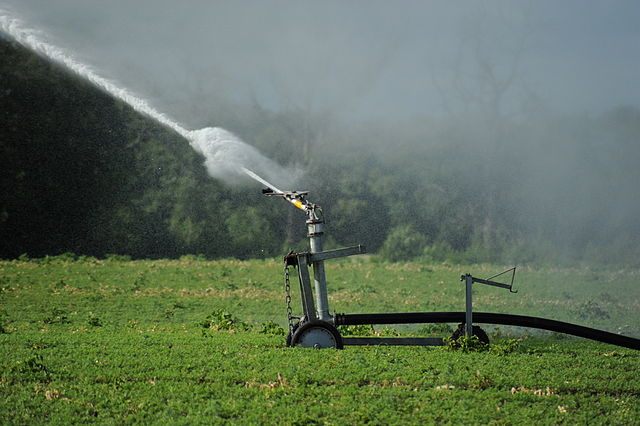
Over 150 farms across England have been found illegally taking excessive amounts of water from rivers, lakes and underground sources, a BBC investigation has revealed.
Since mid-2022, there have been nearly 200 breaches of water abstraction permits, which allow farmers to draw water from local sources, according to data from the Environment Agency obtained via a Freedom of Information request.
Of those incidents, 141 posed a threat of environmental harm—yet just one farmer has been prosecuted.
The Environment Agency responded by stating it conducts around 3,000 licence inspections annually, and that prosecution is considered a “last resort for persistent offenders”.
River campaigners described the breaches of so-called abstraction licences as “the tip of the iceberg”, criticising the current enforcement system in England as offering “no deterrent effect”.
The National Farmers’ Union (NFU) said it supported “proportionate regulation” of water abstraction, favouring an approach that prioritises “education before enforcement”.
The recorded breaches span from the start of the record-breaking heatwave of 2022—which placed significant pressure on water supplies—through to this year, which has seen the UK’s sixth driest spring since records began in 1836.
In England, water is abstracted not only by water companies for public supply but also by industry and the energy sector, for example to cool power stations. However, agriculture also requires large volumes of water for irrigation—especially for high-demand crops such as potatoes during extended dry periods.
Over-abstraction, particularly during drought conditions, can drastically reduce river levels and negatively impact fish, wildlife, habitats and water quality, while exacerbating pollution.
Under the Water Resources Act 1991, anyone abstracting more than 20,000 litres of water per day must hold a licence. The Environment Agency is responsible for monitoring farms and inspecting for breaches, which may constitute a prosecutable offence.
According to figures obtained by BBC News through an Environmental Information Regulations (EIR) request, 199 breaches were committed by 154 farms between 2022 and June this year. Of these, 141 were categorised as level one, two or three breaches—all considered to have a foreseeable impact on “human health, quality of life or the environment”.
Despite this, only one farmer was prosecuted and one issued with a civil sanction in the form of a fine. A further 137 received either a warning or advice, while no action was taken in three cases.
There are currently 12 ongoing investigations.
Ten farms breached their licences in the first five months of this year alone. An additional four were found abstracting water without any licence whatsoever.
The data follows a report by green watchdog The Office for Environmental Protection (OEP), which found that some licence-holders may be inspected only once in two decades. It also revealed that, in 2023/24, 84% of abstraction licences were not inspected at all.
Dr Justin Neal, of river conservation group WildFish, said the number of farms found to be over-abstracting represented “the tip of the iceberg”. He added that the current exemption allowing farmers to abstract up to 20,000 litres per day without a licence made it impossible to know the true extent of water usage across English farms.
“With a minimal risk of being caught and few prosecutions, there is absolutely no deterrent effect.
“That means taking too much water is now an acceptable occupational risk,” he explained.
WildFish is now calling for more frequent inspections and a new enforcement strategy, with less emphasis on advisory approaches and more frequent use of “appropriate sanctions” for breaches.
NFU vice-president Rachel Hallos said farmers were committed to working with the Environment Agency to deliver “practical, on-farm solutions” to water usage challenges.
“We support proportionate regulation to uphold environmental standards and back the Environment Agency’s approach of prioritising education before enforcement,” she added.
“Water is essential to food production, which is why we also continue to call for greater investment in infrastructure to support resilience on farms.”
The Environment Agency said it would be enhancing its inspection regime through the use of technology such as satellite monitoring to assess irrigation levels and identify the highest-risk abstraction using intelligence-led methods.
A spokesperson for the Agency stated it takes its role as regulator of England’s water resources “extremely seriously”.
“If sites are found to breach their abstraction licence, we take an advice-led and proportionate approach with prosecution as a last option for persistent offenders,” she added.
The Department for Environment, Food & Rural Affairs (Defra) announced that the number of farm inspections would increase to 6,000 a year by 2029.
In June, the Environment Agency also published its five-year National Framework for Water Resources, which outlines how water companies, agriculture, businesses and the public should sustainably manage water use into the future.
The framework sets out measures to ensure all water abstraction is environmentally sustainable, with enhanced protections for particularly sensitive habitats such as chalk streams.
While acknowledging the pressures water shortages place on food production, the Agency said it would work with farmers to improve resilience through shared water resources and the development of jointly owned reservoirs.
——————————————————————————
At Natural World Fund, we are passionate about restoring habitats in the UK to halt the decline in our wildlife.

